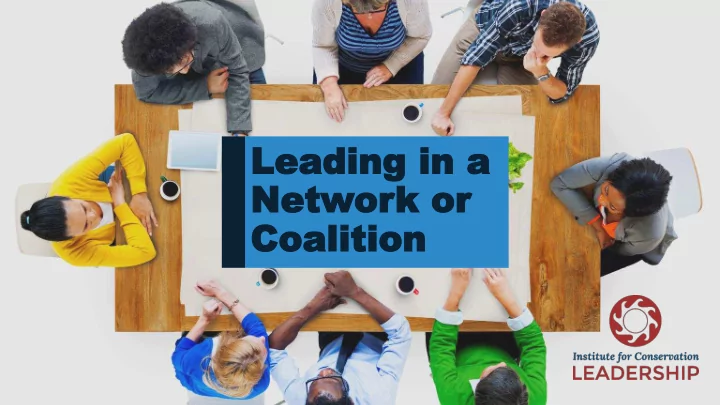

Leading Leading in a in a Netw Networ ork k or or Coalition Coalition
Welcome
GOALS • Identify your strengths and growing edge • Discuss ways to improve your network/coalition • Strengthen influencing and communications skills • Share ideas; Leave with practical next steps
AGENDA 1. Overview and intros 2. Directions of Leadership 3. The “Less Visible” Approach: Leadership Practices 4. Assessment 5. Action Plan – Mapping Your Strategy
In Pairs In your collaborative effort: • Number of entities? • Amount of diversity? • Length of time you are leader? • Over the last year - biggest successes?
LEADERSHIP DEFINED Adaptive leadership is the Leadership is the art of practice of mobilizing mobilizing others to want people to tackle tough to struggle for shared challenges and thrive. aspirations. Ron Heifetz, co-author of The James Kouzes, co-author of Practice of Adaptive Leadership The Leadership Challenge
DIRECTIONS OF LEADERSHIP Others “Above” Others Others YOU “Beside” “Beside” Others “Below”
Definitions They have authority/ power to decide, give, do Peers, more equal You decide, direct, give to, tell
Map Your Leadership 1. List some stakeholders 2. Prioritize and circle 2-3 YOU
How to Lead Up 1. See them as an ally Understand: what’s in it for 2. them 3. Adapt to style and needs 4. Use strategy Rules for the River
How to Lead Sideways 1. Make and keep realistic commitments Respect each other’s work 2. 3. Get buy-in Rules for the River
How to Lead Down 1. Directly communicate expectations 2. Be receptive to feedback and/or choices 3. Do not be afraid of your own self-disclosure Rules for the River
Discuss Priority Stakeholders: Individually 1. What isn’t working? 2. What am I excited to try? In pairs 1. What insights do I have? 2. What muscles to flex? To strengthen?
Aha
COLLABORATIVE LEADERSHIP Catalyze Culture of Cooperation Use Vision to Navigate Share Power & Generate Momentum
Catalyze Culture of Cooperation 1. Listen deeply 2. Show gratitude and appreciation 3. Use both/and thinking 4. Communicate openly and clearly 5. Foster camaraderie and trust
Share Power to Generate Momentum 6. Create space for others 7. Embrace ambiguity; encourage innovation 8. Develop enough infrastructure 9. Resolve conflicts in values/beliefs
10.Hold clear picture of purpose 11.Help people understand progress/success 12.Courageously adapt Use Vision to Navigate
Match Medium to Message
High degree of complexity and/or feedback Self needed One on One Subgroup Whole Low degree of complexity and/or feedback needed
High degree of complexity and/or feedback Self needed One on One Subgroup Whole Low degree of complexity and/or feedback needed
Leadership Practices Which of the leadership practices seem most important to your collaboration right now? What are the implications for your leadership?
YOUR NEXT STEPS • Action Plans • Leadership pairs We dare you! Set a phone appointment within 4-6 weeks with your partner • Turn plans in to ICL Receive within 7-10 days plus ICL’s assessment tool for networks and coalitions
Thank you! www.icl.org
Recommend
More recommend